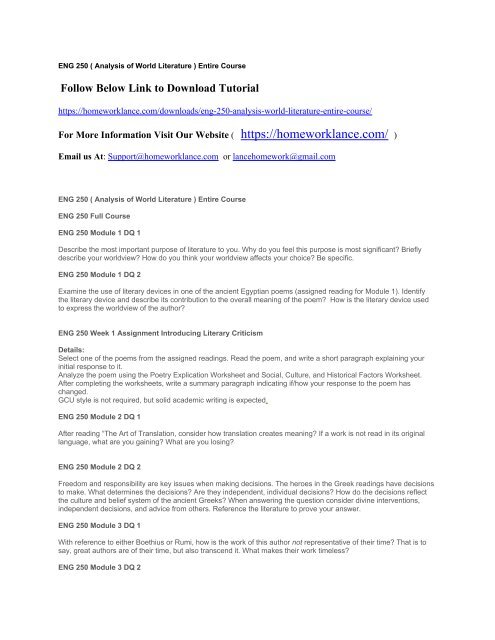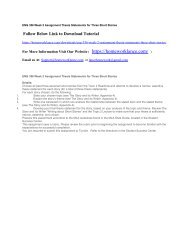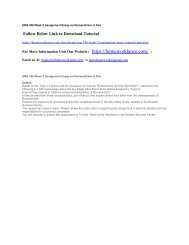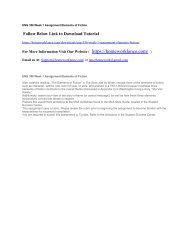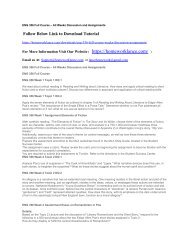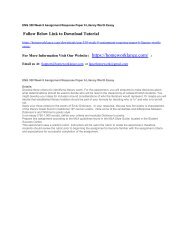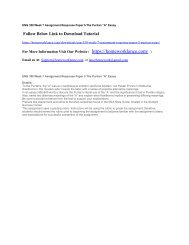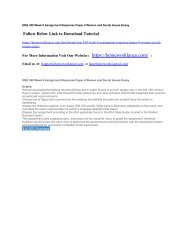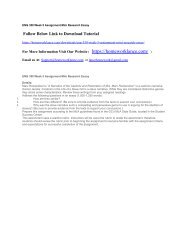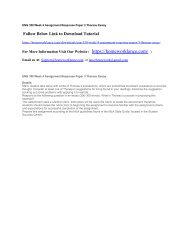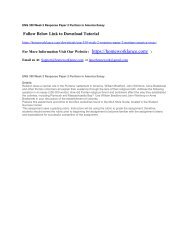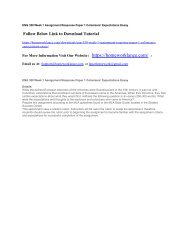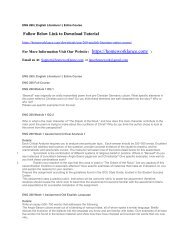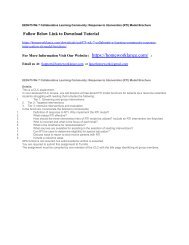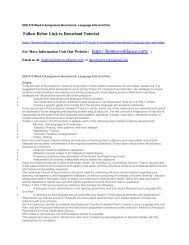ENG 250 ( Analysis of World Literature ) Entire Course
You also want an ePaper? Increase the reach of your titles
YUMPU automatically turns print PDFs into web optimized ePapers that Google loves.
<strong>ENG</strong> <strong>250</strong> ( <strong>Analysis</strong> <strong>of</strong> <strong>World</strong> <strong>Literature</strong> ) <strong>Entire</strong> <strong>Course</strong><br />
Follow Below Link to Download Tutorial<br />
https://homeworklance.com/downloads/eng-<strong>250</strong>-analysis-world-literature-entire-course/<br />
For More Information Visit Our Website ( https://homeworklance.com/ )<br />
Email us At: Support@homeworklance.com or lancehomework@gmail.com<br />
<strong>ENG</strong> <strong>250</strong> ( <strong>Analysis</strong> <strong>of</strong> <strong>World</strong> <strong>Literature</strong> ) <strong>Entire</strong> <strong>Course</strong><br />
<strong>ENG</strong> <strong>250</strong> Full <strong>Course</strong><br />
<strong>ENG</strong> <strong>250</strong> Module 1 DQ 1<br />
Describe the most important purpose <strong>of</strong> literature to you. Why do you feel this purpose is most significant? Briefly<br />
describe your worldview? How do you think your worldview affects your choice? Be specific.<br />
<strong>ENG</strong> <strong>250</strong> Module 1 DQ 2<br />
Examine the use <strong>of</strong> literary devices in one <strong>of</strong> the ancient Egyptian poems (assigned reading for Module 1). Identify<br />
the literary device and describe its contribution to the overall meaning <strong>of</strong> the poem? How is the literary device used<br />
to express the worldview <strong>of</strong> the author?<br />
<strong>ENG</strong> <strong>250</strong> Week 1 Assignment Introducing Literary Criticism<br />
Details:<br />
Select one <strong>of</strong> the poems from the assigned readings. Read the poem, and write a short paragraph explaining your<br />
initial response to it.<br />
Analyze the poem using the Poetry Explication Worksheet and Social, Culture, and Historical Factors Worksheet.<br />
After completing the worksheets, write a summary paragraph indicating if/how your response to the poem has<br />
changed.<br />
GCU style is not required, but solid academic writing is expected.<br />
<strong>ENG</strong> <strong>250</strong> Module 2 DQ 1<br />
After reading “The Art <strong>of</strong> Translation, consider how translation creates meaning? If a work is not read in its original<br />
language, what are you gaining? What are you losing?<br />
<strong>ENG</strong> <strong>250</strong> Module 2 DQ 2<br />
Freedom and responsibility are key issues when making decisions. The heroes in the Greek readings have decisions<br />
to make. What determines the decisions? Are they independent, individual decisions? How do the decisions reflect<br />
the culture and belief system <strong>of</strong> the ancient Greeks? When answering the question consider divine interventions,<br />
independent decisions, and advice from others. Reference the literature to prove your answer.<br />
<strong>ENG</strong> <strong>250</strong> Module 3 DQ 1<br />
With reference to either Boethius or Rumi, how is the work <strong>of</strong> this author not representative <strong>of</strong> their time? That is to<br />
say, great authors are <strong>of</strong> their time, but also transcend it. What makes their work timeless?<br />
<strong>ENG</strong> <strong>250</strong> Module 3 DQ 2
Augustine and Boethius are two <strong>of</strong> the foundations for medieval Christian literature, and continue to have an impact<br />
today. Respond to these texts, drawing on your own personal experience.<br />
<strong>ENG</strong> <strong>250</strong> Week 3 Assignment The Ancient <strong>World</strong>view<br />
Details:<br />
Select two pieces <strong>of</strong> literature from a culture that you have already met. Using the Social, Culture, and Historical<br />
Factors Worksheet, organize your thoughts; explore this culture’s worldview as evidenced by the two works selected.<br />
You may also wish to use the Poetry Explication Worksheet to help organize your thoughts as well.<br />
In an essay (500-750 words), show how the worldview is communicated through the use <strong>of</strong> various literary devices.<br />
Use at least two scholarly sources, outside <strong>of</strong> the course readings, to support your view.<br />
Prepare this assignment according to the guidelines found in the GCU Style Guide, located in the Student Success<br />
Center.<br />
This assignment uses a grading rubric. Instructors will be using the rubric to grade the assignment; therefore,<br />
students should review the rubric prior to beginning the assignment to become familiar with the assignment criteria<br />
and expectations for successful completion <strong>of</strong> the assignment.<br />
<strong>ENG</strong> <strong>250</strong> Module 4 DQ 1<br />
With regard to The Song <strong>of</strong> Roland, to what extent do you resemble the “ideal audience” that the text assumes? What<br />
assumptions seem to be made about the class, age, gender, or other characteristics <strong>of</strong> the audience?<br />
<strong>ENG</strong> <strong>250</strong> Module 4 DQ 2<br />
Animals play an important role in The Thousand and One Nights; however, the animals play different roles in the<br />
imaginary worlds <strong>of</strong> father and daughter. Explain how these differences reflect the contrasting visions <strong>of</strong> gender<br />
relations that are important to the overall theme <strong>of</strong> the writing.<br />
<strong>ENG</strong> <strong>250</strong> Module 5 DQ 1<br />
Compare and contrast the language and intent in Petrarch’s Sonnet 90 from the readings and Shakespeare’s Sonnet<br />
130 located in the lecture, and place these first in the context <strong>of</strong> their time, and then in the context <strong>of</strong> our own time.<br />
<strong>ENG</strong> <strong>250</strong> Module 5 DQ 2<br />
Discuss the points <strong>of</strong> contrast between “Cantares Mexicanos,” and the writings <strong>of</strong> Machiavelli.<br />
<strong>ENG</strong> <strong>250</strong> Week 5 Assignment The Writer and the <strong>World</strong><br />
Details:<br />
From the assigned readings covered in the course (or with permission from the instructor, an appropriate author not<br />
covered), select an author. You will explore how the author’s social, cultural, and historical setting influenced the<br />
mechanics and subject matter <strong>of</strong> his or her writings in a paper (500-750-words).<br />
Use a minimum <strong>of</strong> two scholarly resources from the GCU Library.<br />
Prepare this assignment according to the guidelines found in the GCU Style Guide, located in the Student Success<br />
Center.<br />
<strong>ENG</strong> <strong>250</strong> Module 6 DQ 1<br />
Scan the Module 6 Lecture. Choose three terms relating to drama, and examine how these words will help you in<br />
understanding and discussing drama, especially with reference to the plays discussed in the lecture or the assigned<br />
readings.<br />
<strong>ENG</strong> <strong>250</strong> Module 6 DQ 2<br />
Compare and contrast the two versions <strong>of</strong> the “Chimney Sweeper.” Explain the purpose <strong>of</strong> these two versions. What<br />
literary devices are used in the poetry to create overall meaning?<br />
<strong>ENG</strong> <strong>250</strong> Week 6 Assignment Collaborative Learning Community Reflective Diary
Details:<br />
This is a CLC assignment.<br />
Each week, the instructor will assign to each group its own additional discussion question from the pool, for the group<br />
to explore together, in reference to the assigned readings each week. Citations and references to academic research<br />
should be incorporated.<br />
At the end <strong>of</strong> each module, the group should compose a summary <strong>of</strong> the discussion with proper citations according to<br />
the GCU Style Guide. The group should also be trying to understand and frame their discussion in the context <strong>of</strong> the<br />
overarching themes for the course introduced in the Module 1 Lecture.<br />
In Module 6, these summaries will be compiled into a single 500-700-word paper to reflect the evolution <strong>of</strong> the<br />
group’s discussion.<br />
Prepare this assignment according to the guidelines found in the GCU Style Guide, located in the Student Success<br />
Center.<br />
<strong>ENG</strong> <strong>250</strong> Module 7 DQ 1<br />
With reference to the various works <strong>of</strong> literature studied in this course, identify and explore some <strong>of</strong> the universal<br />
human themes. Explain why it makes sense to compare and contrast works from different eras.<br />
<strong>ENG</strong> <strong>250</strong> Week 7 Major Paper<br />
Details:<br />
With reference to the literature studied in this course, and using specific examples, analyze the ways and assess the<br />
impact various authors interact with their world in a paper (1,000-1,<strong>250</strong>-words).<br />
1. You may use your Modules 3 and 5 papers as foundations (i.e., the analyses performed) to compose your<br />
major paper in addition to other sources.<br />
2. Does literature shape a culture’s worldview, or is it worldview that shapes literature?<br />
3. Incorporate a minimum <strong>of</strong> four credible, scholarly sources using suggested additional readings and/or GCU<br />
library sources or credible Internet sources.<br />
Prepare this assignment according to the guidelines found in the GCU Style Guide, located in the Student Success<br />
Center.


